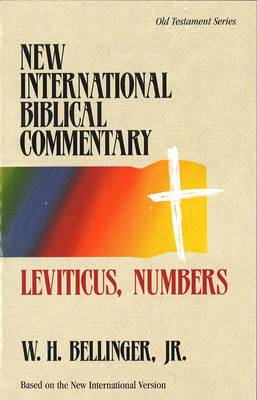New International Biblical Commentary Old Testament
1 primary work
Book 3
Leviticus and Numbers can be difficult for modern readers. In this accessible distillation of scholarship on these two books, Bellinger attends to the cultural structures through which they developed, their literary shape, and their theological perspectives. He hopes to facilitate a dialogue between Leviticus, Numbers and modern readers. Bellinger explores recurring themes of God's divine presence with the people, the holiness of God and God's people, the purity and wholeness that are required for worship, and the sacrificial systems that provide a way to deal with impurity. He also examines the way Leviticus and Numbers provide the modern reader with stories about Israel's successes and failures in living within the order of these systems.
"In his characteristically clear, competent, and comprehensive manner, Bill Bellinger offers a commentary on Leviticus and Numbers that will be useful in both church and academy. He manages beautifully the difficult task of being both detailed and accessible and of being exhaustive without being exhausting. Bellinger is thoroughly familiar with what he calls 'the worship texts of the Old Testament.' He is sensitive to both the ancient and modern contexts, and he interprets Leviticus and Numbers theologically, using the most recent scholarly tools, including cultural, literary, and canonical perspectives. The commentary is a marvelous example of the kind of 'believing criticism' that the series intends and that is capable of speaking to contemporary people, who, like ancient Israel, often find ourselves on a journey in the wilderness."
-J. Clinton McCann Jr., Evangelical Professor of Biblical Interpretation, Eden Theological Seminary
"In his characteristically clear, competent, and comprehensive manner, Bill Bellinger offers a commentary on Leviticus and Numbers that will be useful in both church and academy. He manages beautifully the difficult task of being both detailed and accessible and of being exhaustive without being exhausting. Bellinger is thoroughly familiar with what he calls 'the worship texts of the Old Testament.' He is sensitive to both the ancient and modern contexts, and he interprets Leviticus and Numbers theologically, using the most recent scholarly tools, including cultural, literary, and canonical perspectives. The commentary is a marvelous example of the kind of 'believing criticism' that the series intends and that is capable of speaking to contemporary people, who, like ancient Israel, often find ourselves on a journey in the wilderness."
-J. Clinton McCann Jr., Evangelical Professor of Biblical Interpretation, Eden Theological Seminary
